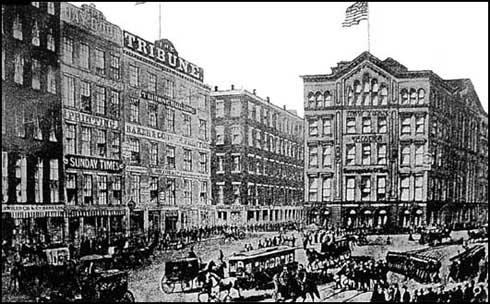New York Tribune
Horace Greeley founded the New York Tribune in 1841. Greeley took a strong moral tone in his newspaper and campaigned against alcohol, tobacco, gambling, prostitution and capital punishment. However, his main concern was the abolition of slavery and the introduction of universal suffrage.
Greeley was very interested in socialist and feminist ideas and published articles by Karl Marx, Charles Dana, Margaret Fuller and Jane Grey Swisshelm in his newspaper. He also promoted the views of Albert Brisbane, who wanted society organised into co-operative communities.
After the demise of the Whigs, Greeley supported the Free Soil Party. He was one of the leaders of the campaign against the 1850 Fugitive Slave Law and in 1856 helped form the Republican Party.
During the Civil War Greeley and the New York Tribune supported Abraham Lincoln, but opposed his renomination in 1864. Greeley was highly critical of the presidency of Ulysses G. Grant and became associated with the Radical Republicans. Later he helped form the Liberal Republican Party.

Clarence Darrow wrote about the influence Horace Greeley and the New York Tribune: "From my youth I was always interested in political questions. My father, like many others in northern Ohio, had early come under the spell of Horace Greeley, and, as far back as I can remember, the New York Weekly Tribune was the political and social Bible of our home. I was fifteen years old when Horace Greeley ran for the presidency. My father was an enthusiastic supporter of Greeley and I joined with him; and well do I remember the gloom and despair that clouded our home when we received the news of his defeat."
In 1872 he Liberal Republican Party nominated Greeley as their candidate and he stood against Ulysses G. Grant for the presidency. During the campaign Thomas Nast produced a series of cartoons attacking Greeley. He commented that the venom of these cartoons were so bad that he "scarcely knew whether he was running for the presidency or the penitentiary." Greeley, won 40% of the popular vote but died soon afterwards on 29th November, 1872. One friend claimed that he had been "crushed by the unmerciful ridicule Nast had heaped on him."
Primary Sources
(1) Clarence Darrow, The Story of My Life (1932)
From my youth I was always interested in political questions. My father, like many others in northern Ohio, had early come under the spell of Horace Greeley, and, as far back as I can remember, the New York Weekly Tribune was the political and social Bible of our home. I was fifteen years old when Horace Greeley ran for the presidency. My father was an enthusiastic supporter of Greeley and I joined with him; and well do I remember the gloom and despair that clouded our home when we received the news of his defeat.
Our candidate, Samuel J. Tilden, was elected in 1876, but was not allowed to take his seat. The Civil War was not then so far in the background as it is now, and any sort of political larceny was justifiable to save the country from the party that had tried to destroy the union. So, though Tilden was elected, Rutherford B. Hayes was inaugurated and served Tilden's term.
